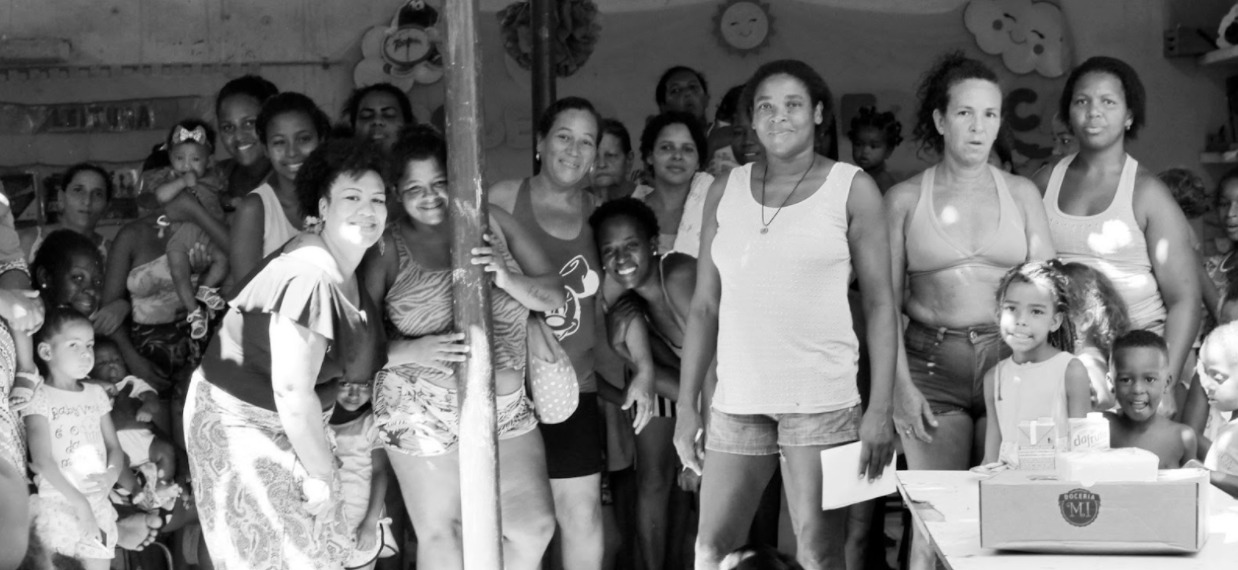Pictured above: Women in the community of Favelinha, the urban periphery of Rio de Janeiro, Brazil. Photo courtesy of Há Esperança.
Following a sexuality education workshop for adolescents in Favelinha, urban-periphery of Rio de Janeiro, Brazil, a local woman — we’ll call her Carla — approaches one of the TabuTabu facilitators to express her support for safely and openly talking about sexuality with youth. Carla knows the importance of dismantling the taboos around sexuality, and of learning to communicate as equals with one’s sexual partner(s), first-hand: She is in her early forties and pregnant with her sixth child, and she explains that this is going to be her last pregnancy because she just learned how to use a condom the previous week.
Pictured above: A TabuTabu workshop with adolescents of the Favelinha community in urban-periphery Rio de Janeiro, Brazil, co-facilitated by an educator from the local partner NGO Há Esperança, on healthy vs unhealthy communication in relationships.
Favelinha is a small shantytown community of approximately 2,000 people who, according to an informal census run by a local NGO, live on an average monthly income of R$ 597.57 (US$ 108) per family of four — equivalent to approximately half the official local minimum wage per person. Favelinha is one of the over 13,100 favela communities in Brazil that are made up of more than 5 million informal residencies. Housing within favelas is not formally regulated, and many homes are overcrowded with multiple generations living under one roof. Sexual and gender-based violence, unintended (teenage) pregnancies, and STI infections are part of the reality in these communities. Safely talking about sexuality usually isn’t.
Laura Ramos Tomás, one of our Pleasure Fellows, works with locals in Favelinha through her organization TabuTabu, which envisions a world without taboos around sexuality, where people of all walks of life engage in healthy and respectful relationships with themselves and others, thereby contributing to more empathizing and thriving communities. Their work in communities living in poverty replaces the conventional pregnancy, infection, and violence prevention narrative typical in these contexts, with sex-positive and pleasure-based conversations.
People with more (unearned) privilege(s) tend to altogether discard the experience of pleasure in communities of lesser class- and race privilege. The idea that social inequalities overshadow the need for and interest in pleasure is part of the reason that meant Carla only learnt about condom use during her 6th pregnancy: If pleasure and sexuality were acknowledged, normalized, and celebrated as key to the human experience, she would have —at some point during her schooling, in conversation with her parents, siblings and/or friends, or at the very least with health professionals during any of her prior 5 pregnancies— had the opportunity to learn about safer sex in a sex-positive way.
Beyond pregnancy and STI transmission prevention, condom use is a means of engaging in safer sexual behaviours that provide pleasure. When we acknowledge that pleasure is one of the main motivators for engaging in consensual sexual activity, gender, sexual orientation, race, class, income level, eye colour and shoe size become irrelevant – and we can focus on telling everyone, including Carla, that condoms can make sexual activity feel less consequential and therefore more pleasurable: integrating the use of condoms into sexual play reduces possible fears or worries about the risks, making sexual activity more sexy, and therefore (even) more enjoyable for everyone involved.
In response to this self-identified need for sexuality education amongst Favelinha’s adults, TabuTabu is trialling a pleasure-focused sexuality education service for local adult women. Starting in January 2022, Carla and her neighbours will have access to a WhatsApp number that will provide information and answers to their questions related to sexual pleasure, health and rights, referring users to relevant local public healthcare providers where necessary.
Pictured above: TabuTabu founder Laura Ramos Tomás, with the focus group helping shape the Ana Autoestima sexuality education service for adult women in their community.
TabuTabu’s 12-week trial, one of the initiatives that emerged from funding from participation in The Pleasure Project’s first Pleasure Fellowship, organized with support from DKT International, The Case for Her, and Misschiefs, will combine pre-programmed chatbot-like messaging and anonymous conversations with TabuTabu’s educational team, who count on the support of a network of regional practitioners on content development. The initiative will provide detailed insights into the local needs, and has the potential to become a more comprehensive and automated source of pleasure-based, sex-positive information for people living in poverty across favelas in Brazil.
Favelinha-based women who make up the focus group that has been shaping the program from the beginning labelled the service “Ana Autoestima”, meaning Ana Self-Esteem in Portuguese. This latter part of the name was first suggested by Evelyn, a resident and community leader in Favelinha who perfectly demonstrates the final Pleasure Principle: ‘Love Yourself’ as she explains that the name serves as a reminder that “the sex-positive and pleasure-positive information we will have is not about how others feel about us, but about how we perceive ourselves, and how we feel about ourselves.”
The ability to have pleasure is not a privilege — the ability to have pleasure is a human right. On World Human Rights Day, let us ensure that, as such, no one omits pleasure from anyone else’s human experience.
——-
Follow TabuTabu on Instagram @tabutabuorg to see their work with underserved communities in Latin America, or sign up to their newsletter if you would like to receive updates about what they are up to.

